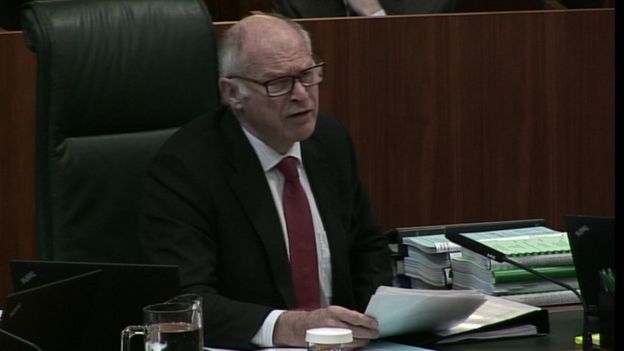
The government has urged the Supreme Court to make a decision the “ordinary man and woman” would understand in the landmark legal challenge over Brexit.
Government lawyer James Eadie QC said ministers could trigger Brexit and that there was no basis for Parliament to get the final say.
He faced a grilling from the 11 Supreme Court justices as he set out his case.
There were queues going into the courtroom and protesters outside on day one of the hearing, which is expected to last four days, with a verdict due in January.
The outcome will have implications for Theresa May’s strategy for EU exit, but it is not a court case on whether or not Brexit actually takes place.
In the first day at the Supreme Court:
- Court president Lord Neuberger said the judges would consider issues impartially and decide the case according to the law
- The government set out why it thinks it should be able to use “prerogative powers” to trigger Brexit
- Ministers have the power to make or unmake treaties, it said
- It said the powers were not a “relic” but a key part of the constitution
- Parliament could have chosen to restrict ministers’ power to act but had chosen not to, it said
- Mr Eadie said Parliament had “carefully selected” which areas it wanted to control, and that where it had not, executive power should apply
At the start of the hearing, Supreme Court president Lord Neuberger said the justices were aware of the public interest in the case and the “strong feelings associated with the many wider political questions surrounding the United Kingdom’s departure from the European Union”.
But he added: “This appeal is concerned with legal issues, and, as judges, our duty is to consider those issues impartially, and to decide the case according to the law.”
He also said some of the people involved in the case had received “threats of serious violence and unpleasant abuse in emails and other electronic communications”, warning anyone that such behaviour “undermines the rule of law”.
The UK voted to leave the EU, by a margin of 51.9% to 48.1%, in a referendum in June.
The prime minister has said she intends to officially notify the rest of the EU of the UK’s intention to leave – beginning two years of talks over the terms of separation – using Article 50 of the Lisbon Treaty by the end of March.
But campaigners, led by investment manager Gina Miller and hairdresser Deir Dos Santos, insist that decision can only be taken by Parliament.
The BBC’s legal correspondent Clive Coleman summarises the points at stake
- The case is about whether the law means that the government needs the authority of Parliament to trigger the process for the UK to leave the EU
- The government argues it can start the Article 50 process using “prerogative powers”, a remnant of the era of all-powerful kings and queens
- Justices will be ruling on who has the legal power to change the rights of British citizens
Monday’s hearing began with Attorney General Jeremy Wright setting out the government’s case.
He said the “royal prerogative” powers the government wants to use to trigger Article 50 were not an “ancient relic” but a “fundamental pillar of our constitution as a sovereign state”.
The government did not seek to use the prerogative “on a whim”, he said.
Mr Wright said the legislation enabling the EU referendum had been passed with the “clear expectation” that the government would implement the result, and that Parliament had had the opportunity to restrict the government’s power to trigger Article 50 but had chosen not to do so.
“If this is all about standing up for Parliament, I say Parliament can stand up for itself,” he said.
Taking over the case, Mr Eadie said it would be “highly improbable” for Parliament, in passing legislation enabling the EU referendum, to have been merely “reserving to itself the right to decide whether to leave or not as it saw fit”.
He said the result of the referendum could not be legally “irrelevant”, adding: “If you asked the ordinary man or woman on the street if they regarded the fact that a referendum has occurred as remotely relevant to the question of whether the government can give Article 50 notice, the answer would be ‘Of course it is’.”
[Source:- BBC]
















